

Volume 10 | Issue 6
Creative Director ABBY RAPOPORT
Design Editor
MARGARET LAAKSO
Video Editor CARLY NICHOLS
Finance Coordinators
HARINI SHANKAR
MAKENZIE KULCYZKI
Member Development Coordinator SARAH LINDENBACH

Standford Lipsey Student Publications Building 420 Maynard St, Ann Arbor, MI 48109
BROOKLYN BLEVINS Editor-in-Chief
APOORVA GAUTAM Publisher
Marketing Director NEHA KOTAGIRI
Print Fashion Editor DANA GRAY
BOBBY CURRIE
Digital Fashion Editor JANAE DYAS
Events Coordinator SENA KADDURAH
Social Media Coordinators
LUIZA SANTOS
MARLEY DAVIS
Print Features Editor
Operations Director AVA BEN-DAVID
CATHERINE AUGUST
Digital Features Editor JANICE KANG
Managing Photo Editor EMMA PETERSON
Public Relations Coordinator ANGELA LI
Print Photo Editors ALEX LAM SINYU DENG
Print Beauty Editor ELISSA LI
Digital Photo Editor SUREET KAUR SARAU
Digital Content Editor JESSICA CHO
Design Team
Liza Miller, Terri Kang, Emily Sun, Katherine Kell, Sebastien Triplett, Tiya Madhavan, Bailey Hwang, Milcah Kresnadi
Fashion Team
Melissa Yu, Tzu-Yun Fun, Reagan Hakala, Janna Jacobson, Paige Tushman, MaryKatherine Acho Tartoni, Elena Shaheen, Taylor Stevens, Juliana Ramirez, Jessica Li, Ligaya Galang, Bobby Currie, Ankitha Donepudi, Sidney Vue, Angela Li, Emily Jennett, Subin Yang, Riley Neville, Richalin Digue, Sigourney Acharya, Aurelia Hudak, Meera Kumar
Features Team
Lynn Dang, Sailor West, Shelby Jenkins, Meera Kumar, Ava Shapiro, Mya Fromwiller, Melissa Werkema, Emerson McKay, Lucy Dover, Emma Edmondson, Tara Wasik, Marxie Colliver, Enia McLaughlin, Sebastiana Hobey, Sophia Do
Photography Team
Sureet Sarau, Riley Kisser, Oliver Segal, Paulina Rajski, Yueshan, Jiang, Carly Nichols, Tess Crowley, Maggie Kirkman, Taylor Pacis, Anisha Chopra, Vivian Leech, Anika Minocha, Emmanuelle Cubba, Audrey Eng, Mary Katharine Acho-Tartoni, Patrick Li, Harrison Brown, Sory Keita, Niah Sei, Meleck Eldahshoury, Ava Muntner, Kamryn Washington
Videography Team
Juana Mancera, Takara Wilson, Johannes Pardi, Kaelin Park, Eaman Ali, Sophie Abedi
Digital Content Team
Aurelia Hudak, Sigourney Acharya, Ally Chang, Clare Hong, Kiana Pandit, Irem Hatipoglu, Shari Frazer, Sophie Ding, Haniya Farooq, Emily Jennett,
Finance Team
Erin Casey, Ariah Samant, Elena Reyes, Riya Gone, Elise Hsiao, Emily Farhat, Taylor Jones
Member Development Team
Sam Wright, Maryam Hamka, Cynthia Qian, Erin Segui
Public Relations Team
Lily Fishman, Grace Donnelly, Fiona Huang, Alia Gamez
Events Team
Tara Nayak, Erin Segui, Tiara Blonshine, Paris Rodgers, Allie Cain, Sanjana Ramanathan
Social Media Team
Marley Davis, Frankie Smith, Grace Wang, Sasha Amani, Lily Shaman, Subin Pyo, Jessica Li, Jessica Kroetsch



3
LETTER FROM THE EDITORS 04 COLORS OF HOME 06 FALLING BACK IN LOVE WITH YOUR HOBBIES 28 DEATH RATIONALIZED 14 GRIEF IN 100 WORDS 12 IN OFFICE 20 THE THINGS WE CARRY 30 HAPPY TO BE HERE 38 STAY UP A LITTLE LONGER 40
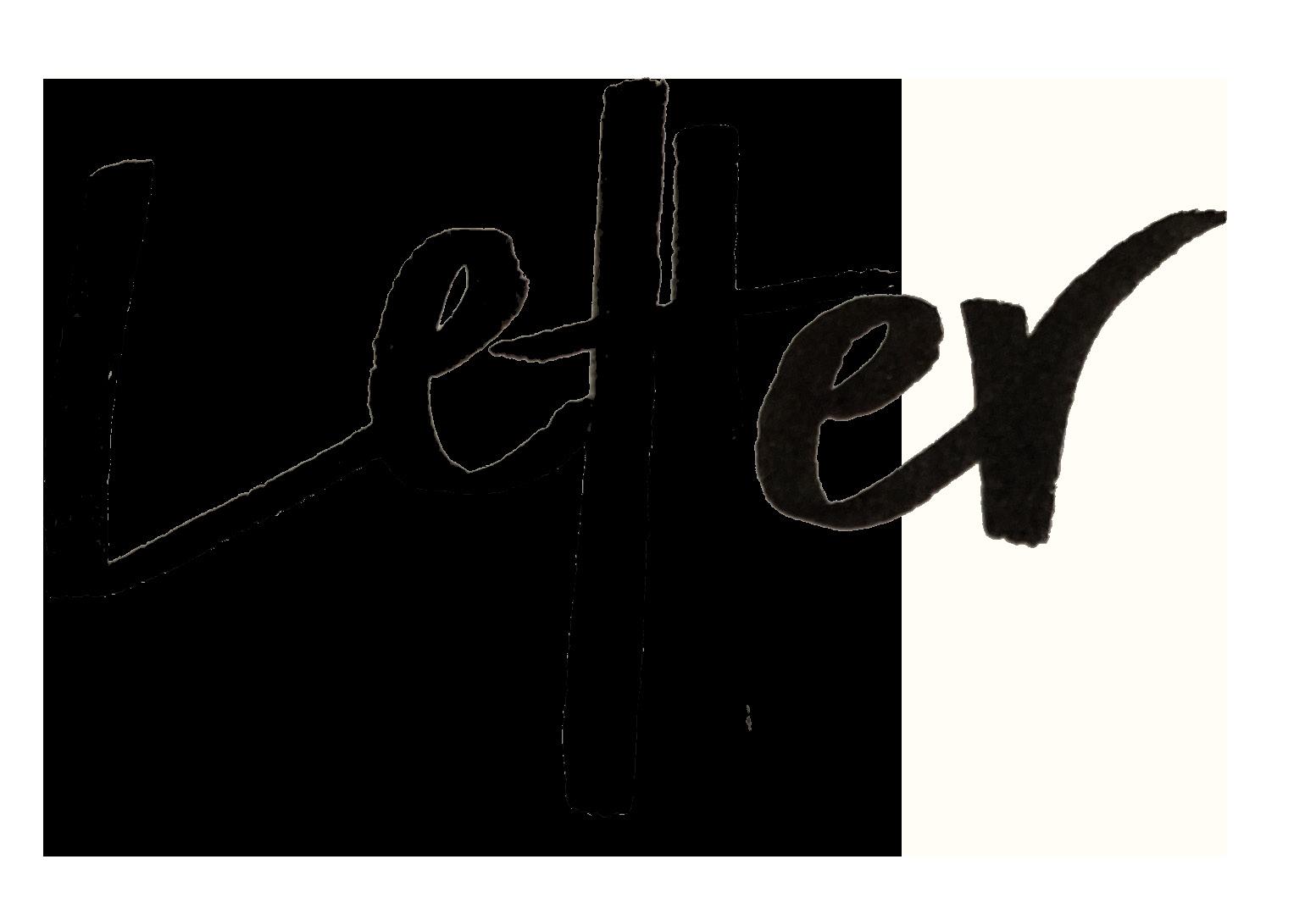
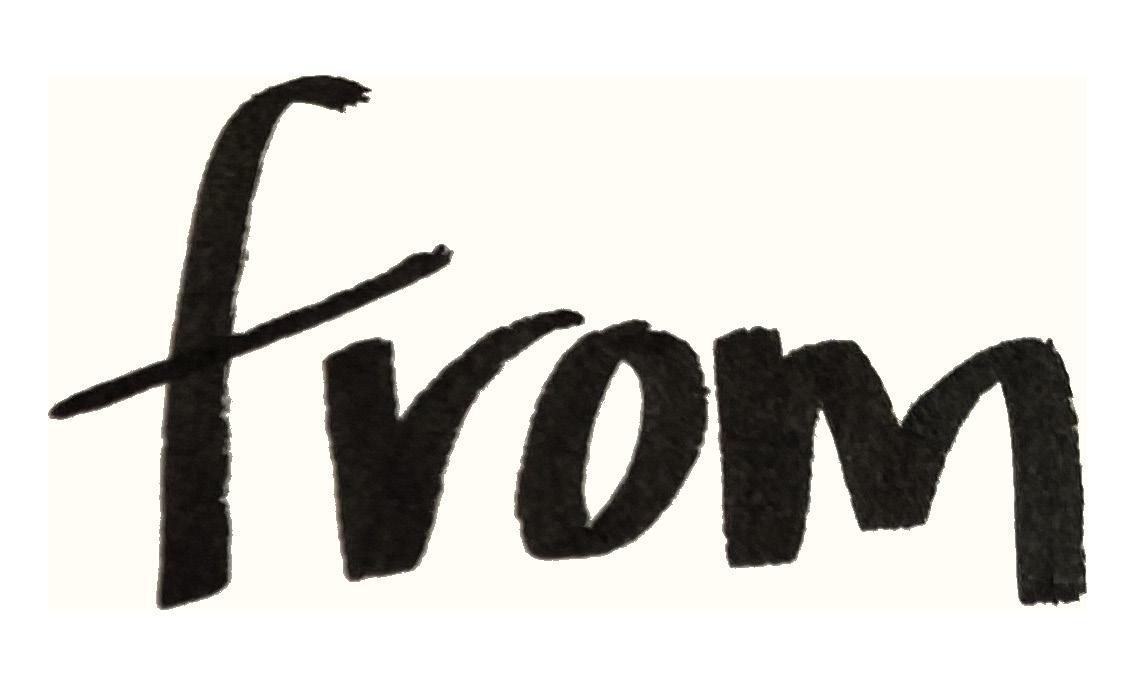

Andsomehow, after a year full of triumph and strife, magazine amidst some of the most emphatically devastating to be creative, inventive, and empathetic, we’ve arrived to present you with our final issue of the school year.
After two semesters full of issues with strategically better way to end the year than to let our members run we tasked our team members to devise individual concepts of course, they delivered!
This issue is a testament to the creative vision, artistry, all year long. And with this as my final issue as Editor-in-Chief, I can genuinely say that getting to know our team members develop and shine over the course of these two semesters, visionary creatives has been one of my greatest pleasures
So it is with great pride that I present to you the creative that make up our organization. I’m beyond grateful for and feel a heartwarming sense of comfort to hand over
To all our readers, thank you for believing in us! Your make all the difficult moments so worthwhile. To my full of passion, community, and creativity! I have learned cannot wait to see how you continue to make SHEI’s legacy

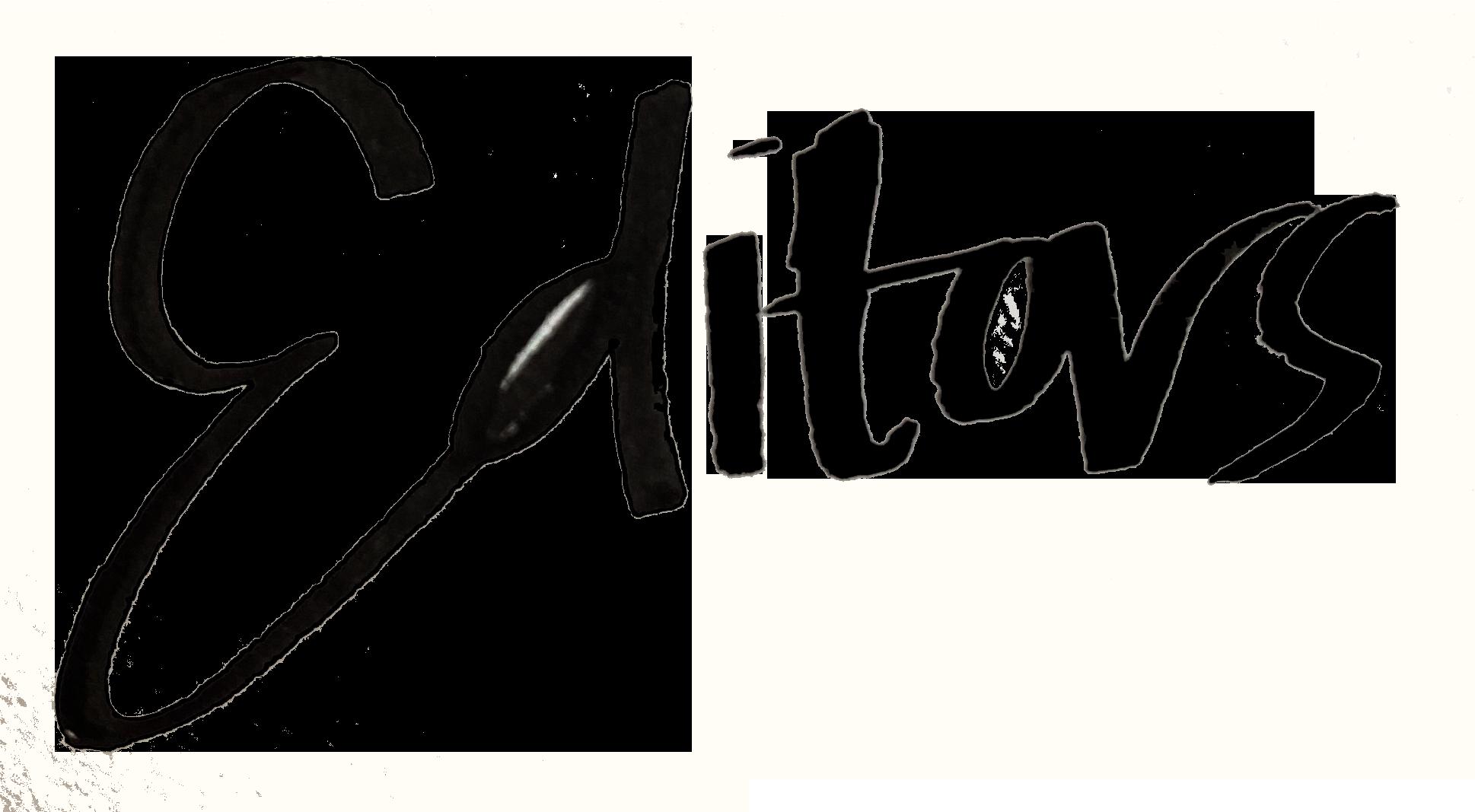
strife, learning to reckon with our position as a culture devastating political times while still pushing ourselves at the end. I am both incredibly proud and melancholy
strategically and artistically devised themes, we thought what run wild. Freed from the confines of a particular theme, concepts for both feature articles and photoshoots, and
artistry, and hard work our team members have brought Editor-in-Chief, and subsequently final Letter From the Editor, members across all editorial teams, seeing their talents semesters, and leading a team of such incredible and pleasures here at UMich.
creative visions of just a handful of the fantastic faces for the trust that they’ve put in me over this past year over the reins to them for this final issue.
Your encouragement and engagement with our issues fellow SHEI members, thank you so much for a year learned so much from each and every one of you and I legacy your own. It’s been an honor and a privilege.
Signing off,
 Brooklyn Blevins Editor-In-Chief
Brooklyn Blevins Editor-In-Chief
5




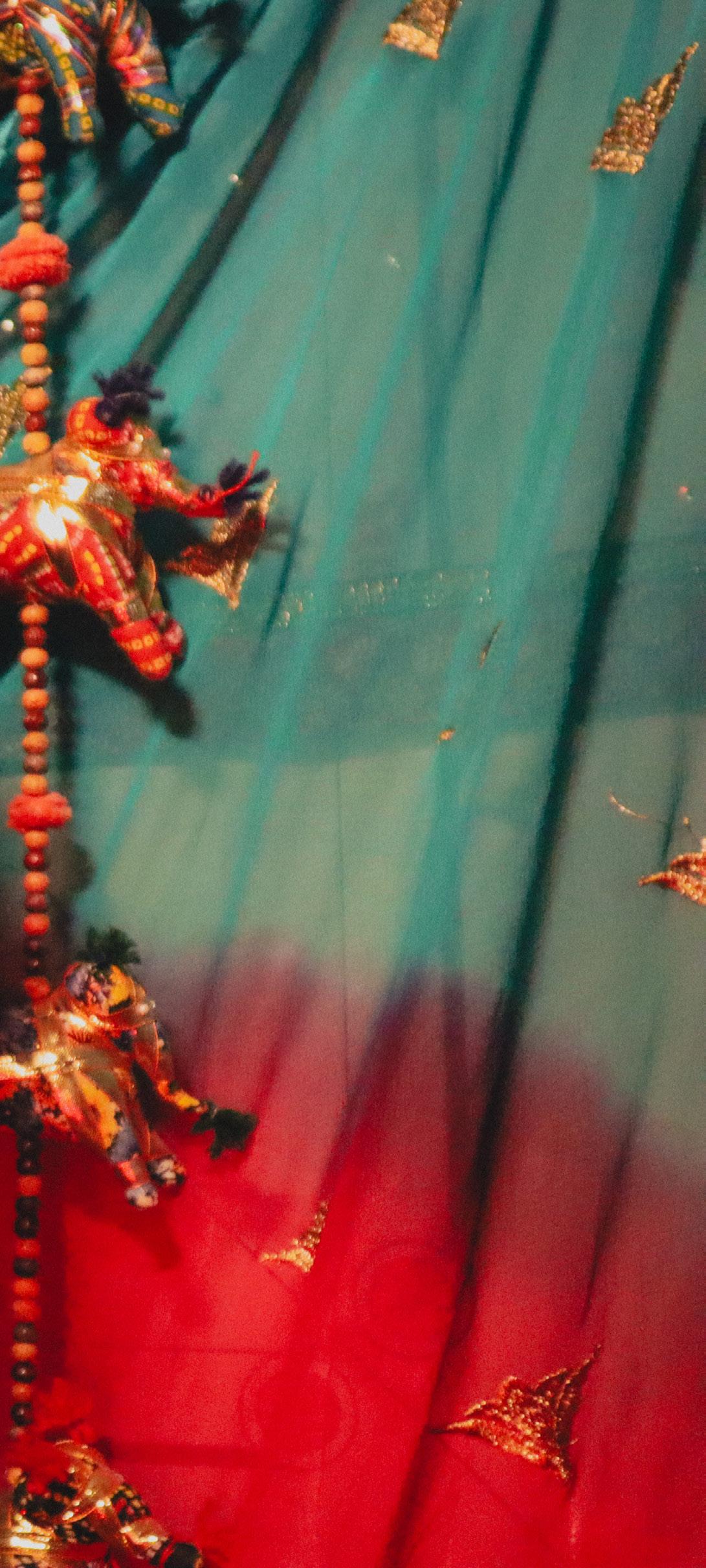
 By Anisha Chopra
By Anisha Chopra
Not my birthplace but I consider it my birth right,
Claiming all the culture for it is what I’ve known my whole life.
While my passport simply claims I am an American citizen, I see myself as a child of immigrants.
Some might say I spent my childhood years “abroad,”
While I would claim I was visiting where my ancestors walked.
I could call my home the land of the free,
As my family wears red, white, and blue proudly.
But the bright colors and patterns of my home far away, Give me Deja vu in the bestest of ways.
They paint my life oh so brightly,
and I claim my heritage like a medal of pride.
7





9

WRITER
ANISHA CHOPRA
SHOOT DIRECTOR
ANISHA CHOPRA
PHOTOGRAPHER
ANISHA CHOPRA FASHION
ANISHA CHOPRA
MODEL
ANISHA CHOPRA
GRAPHIC DESIGNER
KATIE KELL



11
Grief in
Just one week after settling into my shared dorm room, I found myself hauling my belongings across the hall, relocating to a single dorm. Leaving behind my kind roommate, I was burdened by guilt and consumed by shame. I felt overwhelmingly embarrassed by my inability to share living space with a roommate. However, engulfed in grief, I couldn’t bear the thought of exposing my anguish to others. Moving to a single room, I sought refuge in privacy; there, I could collapse on the cold floor, sobbing and venting my frustration at the unfairness of your passing. There, I could grieve.
3 4 8 9 10 15 18 22 23 24 25
In high school, calendar. I attended passed. It was after your passing, anymore. The meticulous schedule faded meticulousness made everything calendar—spanning to the enormity
It was a cool summer day in Maryland, a light breeze offsetting the sun’s warmth. On the backdoor patio, my cousin pelts water balloons at my sister, who promptly returns fire. My mom paints her nails a muted pink, stirring memories of childhood resentment over being barred from wearing red nail polish. In an instant, tears well in my eyes and anger floods from my heart. At 19 years old, I’ve grown past this resentment; but in just a week, it will have been one year without you, and that is too overwhelming. So instead, I’m angry about nail polish.
WRITER CATHERINE AUGUST GRAPHIC DESIGNER EMILY SUN
I was meticulous about keeping an up-to-date attended to it diligently, crossing out events as they essential for getting through each week. But passing, I couldn’t find the energy to keep up with it meticulous care I put into keeping track of my faded away, a distant memory of a past when such meticulousness felt utterly important. The weight of your absence everything else seem trivial. Each day that I lived without a calendar—spanning over a year—served as a silent testament of loss.
100 Words
The daunting reality of Monday mornings, knowing that an 8:30 A.M. class awaits, feels vastly different now. The version of me who willingly signed up for such an early class, before your passing, seems worlds apart from who I am today. Now, waking up before 8:30 A.M. seems unfathomable. I find myself awake until the early hours of the morning unable, maybe unwilling, to fall asleep. I scroll through my camera roll, reminiscing on happy memories, until I feel tears streaming down my cheeks. In these moments, the darkness and solitude of late night feels comforting.
As July rolls around, I become more aware of grief in my body. My heartache manifests as soreness in my arms, legs, and chest. It becomes worse when I sit in my grief, rather than with it. Each inhalation weighs heavily on my lungs, while my heart races with palpitations. When accompanied by headaches and fatigue, these physical manifestations serve as constant reminders of loss. It’s almost too much to bear. Yet, amidst this heaviness, I find solace in acknowledging my grief rather than suppressing it. So, as July unfolds, I allow myself to grieve as my body deems fit.
13
5 13 14 19 20 21 26
WRITER
MARXIE COLLIVER
GRAPHIC DESIGNER
BAILEY HWANG


Decay = illness existence

This is a foundational step.
Raise love to the power of googolplex: love Set it aside for later permutation.
googolplex
breath over & over, forever approaching infinity, never touching it.
Time is an imaginary number, i. Death = 0.
Divide breath by death.
There will be no definition.
This equation is unsolvable.
Multiply lovei(unsolvable solution) to get grief.
Note:
Extraneous results indicate the correct answer is approaching.
Consider this result in all rationalizations of death.
decay
15


Guildfordia yoka feign the fate of swirling into oblivion. Really they just sit on sediment all day and do nothing. Must be nice. Their spires constitute no institution; they are merely architects of their own homes, which they never leave home without. Must be nice. They prefer to roleplay as starfish (though they do a poor job), stretching out their spines searching for hands to hold. They are pink suns drawn in the corners of children’s books, though utterly unaware of it. Yoka (余暇) means leisure and spare time in Japanese, which is their only requirement. Must be nice. Their only destinations are food and sex, to which they travel by spewing goo and swiping it into the floor with their cilia. They are disgusting and impolite, though apathetically accepting of it. Must be nice.
嫉妬 means jealousy in Japanese, which is currently what I mean.


GAP JUNCTION
At the junction, shapes begin shifting and angles turn to corners and lines become objects and as I open the front door you stand bearing gifts. We barter little particles like red herrings, like Trojan horses, before we both light the fuse. The energy pulsating between us two increases the potential until we spill over into an all-or-nothing power-stroke-out overwhelm of chemicals, making allegories out of electronegative relativities and their relevance to you. In consideration for our circumstantial imbalance, we can forgive each other for the impermanence of our positions, Knocking down each other’s doors and walking out scot-free. You are a free-flowing ion road-tripping through my permeable membrane. I am one hell of a doormat. I let you in and cope with the aftermath, I chose you and repeat the consequences for as long as my capacity will hold.
17
REGRESSION ANALYSIS ON SYNDROME


level of cognitive distortion (measured in heart drops)
minutes (since i walked into the par1 2 4 6 9 11 3 7 5 6 12 16 13 14 15

¹ control is a FLEETING FEELING, yet
² my hands are clams,
³ and they are not the rare kind with pearls inside.
⁴ my memory’s full of flamed-out file folders, and
⁵ i only know enough to be a party favor.
⁶ every acquaintance is a movie
⁷ with a third act i cannot understand.
⁸ every lover is a philosophy i cannot wrap my head around.
⁹ this one night stand knows all the greatest bands and ¹⁰ he’s setting me up for FAILURE.
¹¹ joe schmo’s asking about diversions ‘cause he knows
¹² all i do is stare at my phone.
¹³ every conversation is an INTERROGATION
¹⁴ when i’ve armed my brain with artificial intelligence.
¹⁵ they’re ACCUSING me of FRAUDULENCE and ¹⁶ i look GUILTY.
19


in office
21
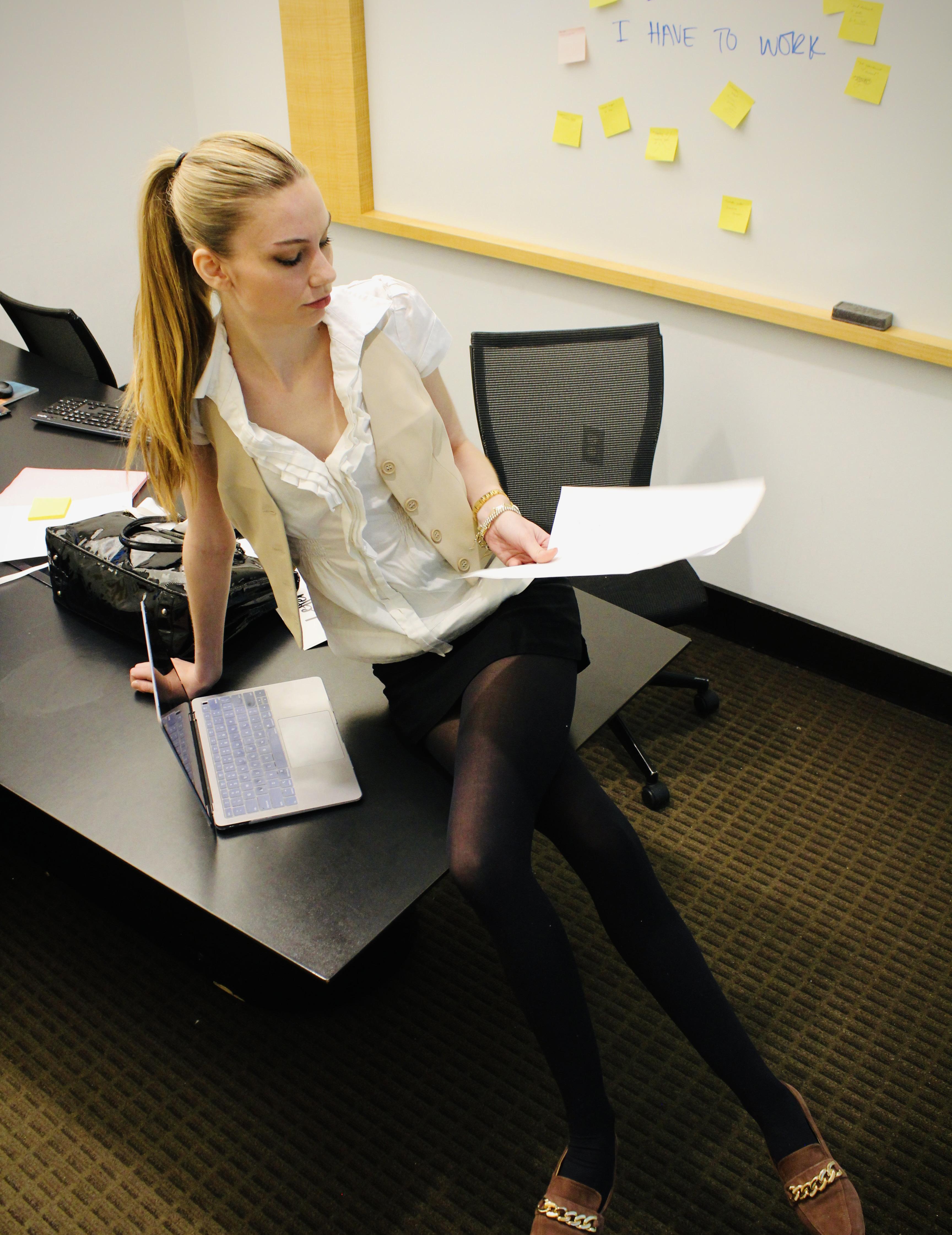
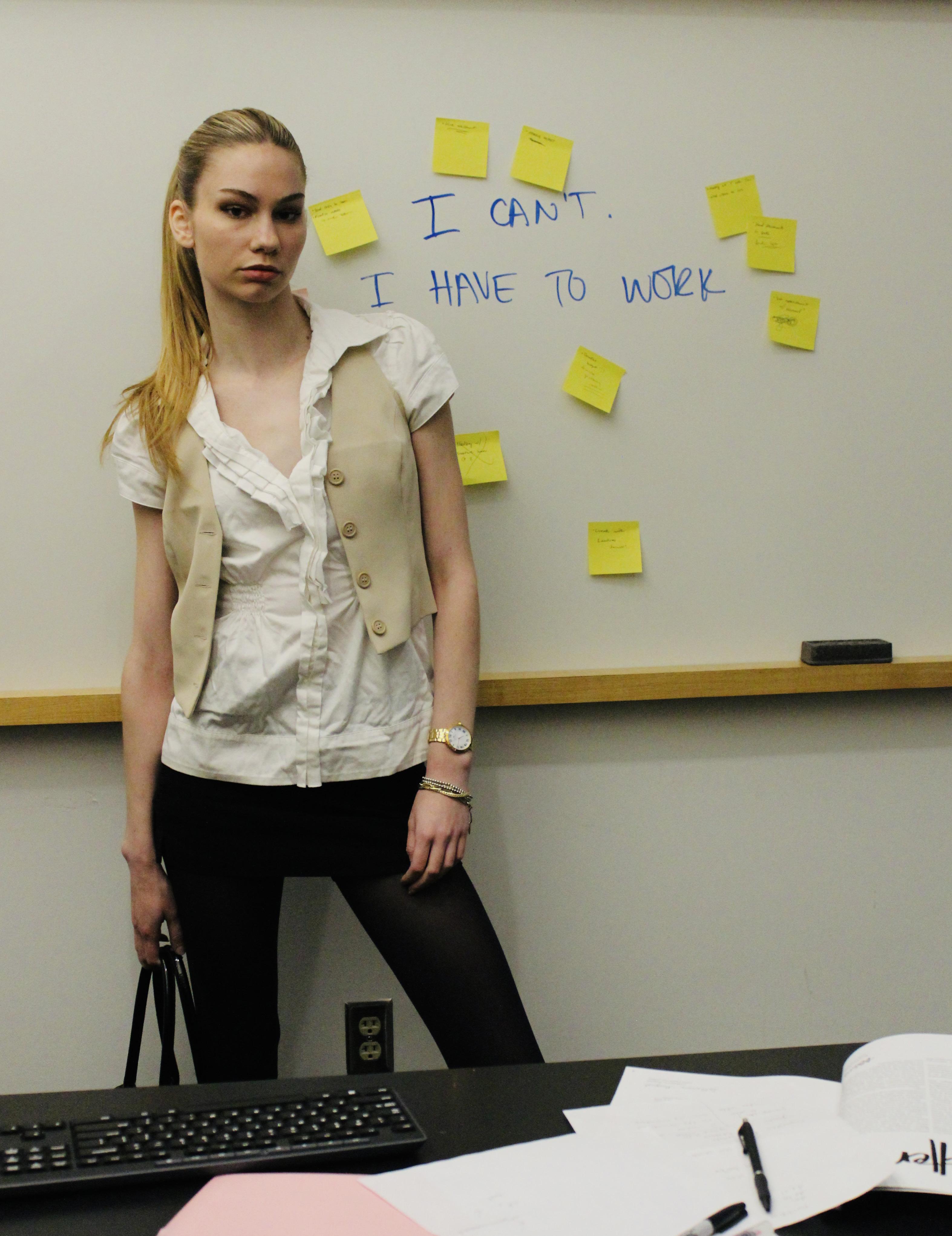
SHOOT DIRECTOR
ELENA SHAHEEN PHOTOGRAPHER
MARY KATHERINE ACHO-TARTONI FASHION
ELENA SHAHEEN VIDEO
KAE PARK MODEL
EMMY EDMONDSON GRAPHIC DESIGNER
TERRI KANG
23


25


27
FALLING BACK IN LOVE
I
’d like you to picture this. A nineteen year old girl is sitting at her desk, laptop opened and a blank document staring back at her. It’s 8:30 pm and she must complete this assignment by 11:59. But this is not an official school assignment, and yet it still feels like one. It’s a piece of writing she offered to write for her club, and yet she’s still spending hours contemplating how to structure her thesis, how to add sources and quotes, and how to follow a rigid format. Of course, this hypothetical girl is me, and it’s actually 9 pm now. Since before I can remember, writing has been a passion of mine. I was an avid reader all throughout elementary, middle, and even most of high school. From the plethora of stories I would fill my mind with, a strong desire to create something similar arose. I began drafting creative pieces and tales when I was around eight years old, and continued doing this long into my teenage years. To me, writing was just as fun, if not more so, than watching a movie or spending long hours with friends.
In contrast, writing now feels like a chore. It must have started sometime in high school, but this feeling has become far more prominent as I’ve been in college. While I used to associate writing with imagination and excitement, I now see it as an assignment or something to check off of my to-do list. Instead of letting my fingers fly across the keyboard,
structuring aside, I now have immense difficulty writing without adhering to specific formatting and argumentation. Because of the countless essays required of me to write for school, I no longer find enjoyment and passion in writing. It’s instead something I feel I need to do to impress others and succeed, rather than do for myself and my happiness.
And, unsurprisingly, writing is not the only hobby that has become tarnished through attending a university. Through both word of mouth and social media, I’ve heard numerous students admit that an extracurricular or activity they once adored as a kid has now become so associated with school and evaluation that the spark and passion once found in the activity has dissipated. For example, college sports seem to have become more and more competition based rather than for enjoyment, now creating stress and anxiety in individuals instead.
Of course, it’s not always the case that you’ve stopped enjoying a previous hobby because of exhausting it, but simply because you’ve grown out of it. But these hobbies are something entirely different. Something that you once loved that has now become tainted with the weight of pressure forced upon your shoulders. Something like football, art, or for me, writing. I believe there are a few specific reasons for why someone may fall out of love with a hobby in college.
WITH YOUR HOBBIES

3
Monotony—doing an activity over and over again for school can train your mind into completing it the same way each time. This causes a lack of creativity, strategy, and mental exertion, resulting in a sort of “brain dead” practice of the activity that’s
Competition and performance—performing this hobby now causes stress because of the pressure to be perfect. It’s not about enjoying the activity, but rather being the best or winning. This is often a result of outside influencing factors, such as the weight
Busyness—we are so busy with school that doing anything other than studying can feel like an additional chore or something to put on the to-do list. This can also go the other way around: We feel guilty doing things for fun because we worry that we should be only focused on school, so we instead try to approach the hobby in a way we would with academics.
No matter the reason, passions and interests are extremely important for individuals to have, especially in college. Here are a few ways that I’ve begun to practice to fall back in love with my passions and a few that I hope to try soon.

1
2 3
Change of scenery—if you’re on a sports team or in a club where you practice your activity, try practicing it outside of that environment and with friends. Make it a fun event where you can all indulge in your pastimes without the pressure of anything else on your back. When you start to make better memories with the activity, you will begin to have more positive associations with the subject which will in turn increase your enjoyment of it, even when doing it for other activities.
Take a break from it—if it’s something that is causing you unnecessary amounts of stress, it may be a good idea to separate yourself from the activity for some time until you begin to crave doing it again.
Maybe this hobby is truly not for you anymore—if you believe it’s been completely ruined or you’ve simply grown out of it, try finding something new that sparks your interest like the other hobby did.
Most importantly, I suggest you don’t think too deeply about it. Forget the structures and strategies and just do it. If you focus too much on other factors, you will never find the enjoyment you’re looking for. With these suggestions, I hope you’ll be able to fall back in love with your hobby in no time.
WRITER MELISSA WERKEMA GRAPHIC DESIGNER TIYA
MADHAVAN
29

STUDY STUDY THE THINGS WE CARRY
THINGS CARRY

31
SHOOT DIRECTOR
REAGAN HAKALA
STYLISTS
REAGAN HAKALA
PHOTOGRAPHER
REAGAN HAKALA
GRAPHIC DESIGNER
MILCAH KRESNADI
MODEL
REAGAN HAKALA
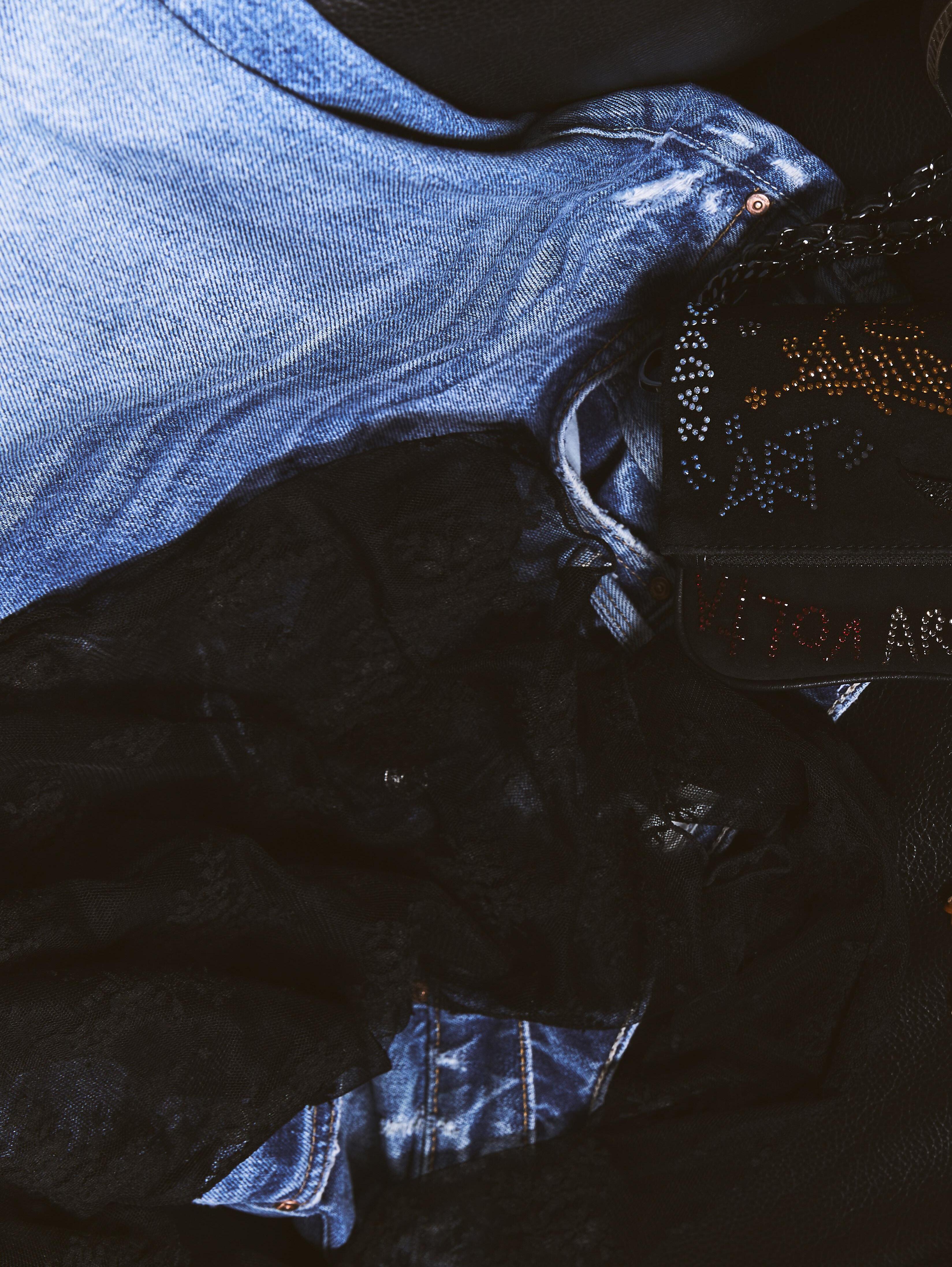
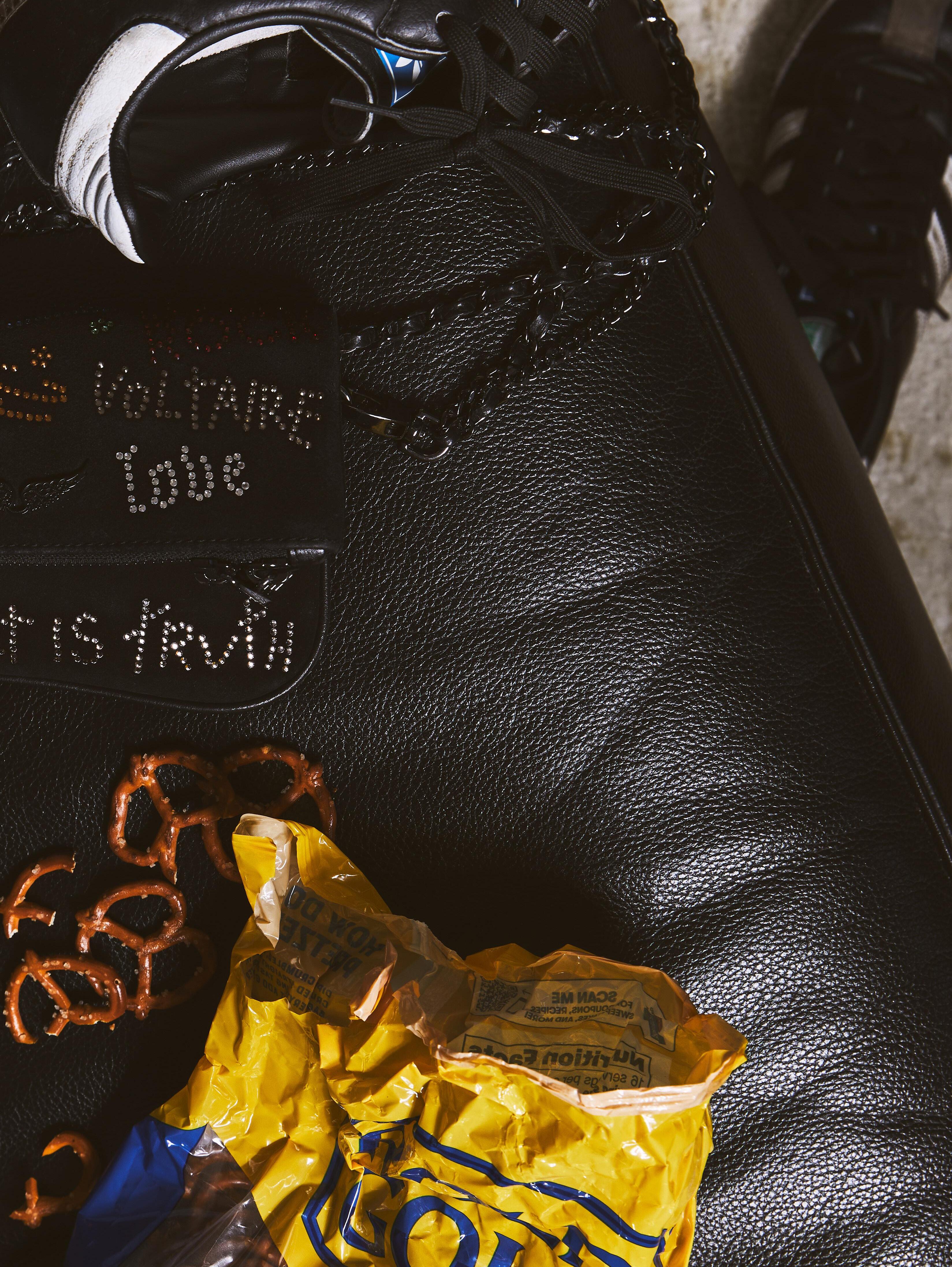
NIGHT N I G H T
33

At a place like the University of Michigan, people seem to love or hate it. It's common to meet alumni or older students getting ready to graduate who tell you that the University of Michigan is the best place in the world. They wish they could relive their memories of living in Ann Arbor, going to tailgates on game days, and even such simple things like walking to class from their college houses. However, as a student, it’s easy to take things like this for granted. With that, it can be even easier to dread your days in college and count them down until graduation. That’s how I felt about my time at Michigan, at least up until recently. As grateful as I felt for going to a prestigious and respected university, my transition into being happy at Michigan was slow.
I was unlucky enough to be a high school graduate in 2020, when the world shut down. At that point, I felt so ready to move on from high school and begin my life as a college student. I worked by butt off to get into Michigan, and after being deferred, waitlisted, and being waitlisted so long that I had committed to a completely different university, I was finally accepted, and my dreams came true.
What they don’t tell you about going to college during a pandemic is that all of the things you were told about that makes college amazing doesn’t apply. No big fun parties, no leaving your door open to invite passersby in, and no walking through a beautiful campus to your classes. It was all just sitting in my single dorm, door closed, with my classes online. Needless to say, my dreams were crushed. Most of my first semester of college was spent alone in my shoebox of a dorm, feeling the loneliest I had ever been. Even though I had my brother and he lived a few blocks away, my mental state was so fragile that it was hard to leave my room if not for going to the bathroom or getting food. I really hated it here. Once we were sent home from the dorms due to COVID-19 cases rising, I was never more grateful
Happy
WRITER
AVA SHAPIRO
GRAPHIC DESIGNER
MARGARET LAAKSO
to go back home and out of Ann Arbor. For the rest of my freshman year, I lived at home, ate home-cooked meals, and barely talked to anyone. While it was a little bit better than being in the dorms, it still wasn’t the fun college experience I was told I would have.
After spending freshman year at home, my sophomore year I was pushed into the deep end and moved into a sorority house, for which I joined over Zoom and had only met a few girls from. I went from having very little human interaction outside of my family to living in a house with 50 girls I barely knew. I was terrified beyond belief. Although I’m a pretty social person, meeting all of these new people at this time in my life was something I wasn’t sure I could handle. Nonetheless, I knew that I was lucky to be going to such a great school and to even have the opportunity to live in a sorority house, so I tried my best to enjoy my time. As the year went on, I made new friends, joined new clubs, and experienced what it was like to really be in college, but I still didn’t feel like I knew my place here. I wasn’t very into partying, so I avoided the fraternities and bars when I could. However, this was the social scene where all of my peers were becoming closer. Even though I knew I wanted to have fun and meet new people, I felt like I didn’t know how to anymore, so I retreated. It was a better time overall than my lonely freshman year, but I still felt lost. I didn’t know why I wasn’t loving going to school here.
Junior year was the time I decided that I would study abroad. As much as Ann Arbor and U of M were slowly starting to grow on me, I really wanted an excuse to get out. I had never been to Europe, and I had always wanted to live in a city, so I decided to apply to schools in London for my second semester. After going through the motions of university life, only really leaving the house for club meetings and classes, I wanted a fresh start. Once I learned that I would be going to London,
HappyBeTo Here
I was filled with an incredible excitement, but also just as much fear as I felt when I was first introduced to college life. Even though the pandemic restrictions of 2020 were mostly in the past, I had residual feelings of anxiety about going somewhere new and the impending loneliness to follow. I knew I needed it, but I still felt like I wasn’t ready.
The days leading up to my flight to London were brutal. I knew that I would be traveling further from home than I had ever been, and going into a new experience akin to going to college for the first time. With my anxiety at a high point and my bags packed, I left home and braved my way to England.
From the moment I stepped off of the plane and into this country I had never been to before, a strange sense of calm entered me. Something about this fresh start, these new opportunities to find myself, made me feel free. The semester hadn’t even started yet, and I already felt more at home in a foreign country than I did at a school I’d attended for three years. As the semester progressed, I met amazing new friends, explored different cultures, took up new hobbies, and completely changed my outlook on my college life. I changed up my hair, I got new clothes, and I wanted to try every new opportunity, whether it was food, travel, or even spending time with people different than myself. During those four months in London, I fell in love with the city, and I learned so much about myself along the way. I finally let myself have fun, and I felt so ready to go back to Michigan feeling like a new person.
Once I returned to Ann Arbor, the anxieties that had plagued my college life, the ones I had thought I was able to let go of, crept back in. Eating dinner with my mom downtown during welcome week before moving into my college house, I had a complete breakdown. Being back in the place where I had experienced some of the worst parts of my life and knowing it would be

so long until I finally got to leave and never come back was so hard for me to handle. And those feelings, even though they were years old and felt like another lifetime just months before, came back all at once. Weeks went by, and although I got more and more used to my environment, moments of residual anxiety came up with reminders of my trauma: passing my old dorm, studying in places where I remember eating by myself, even walking down the sidewalks I remember calling my parents and crying on, wishing I was anywhere but here. These triggers would sneak up on me, making my fear of feeling like that again feel so real. But then, as time went on, these feelings slowly faded away.
Once I settled into my senior year, I started to remember all of the things I learned about myself in London. I took up running, I became more social, I found joy in cooking, and most importantly, I felt confident in myself. Wanting to feel that way in Ann Arbor as well, I decided to go back to those things I had loved while I was there. Living in London, I visited Columbia Road Flower Market every Sunday to pick up fresh flowers and people-watch, admiring the flowers I kept each week. In Ann Arbor, I made sure I always had fresh flowers in my room, even if I had to pick them up from Trader Joe’s and watch all of the fascinating people there. In London, I went on runs almost every day in Regent’s Park. Back in Ann Arbor, I ran in the Arb and Gallup Park, listening to my favorite music and taking time for myself. I started to cook, take care of my space, and most importantly, keep my social relationships strong like I was able to do abroad. With these changes to try and make my life as actively happy as possible, I ended up actually loving college. For the first time, and for real. Once I realized I could make my time in college however I wanted to live, rather than what everyone told me I should do, I was happy to be here. I am, now, happy to be here.
35
WRITER



TARA WASIK
GRAPHIC DESIGNER
LIZA MILLER

The laborious transition to college life has some intermissions of familiarity, such as the unmatched mystique of nightfall. From my childhood routines to my current college rituals, even if the tasks are changing, that special duration right before bed constantly feels both contemplative and extraordinary. As I revisit both my past and current experiences, the people I surround myself with are what I find myself remembering and focusing on the most.
After I brush my teeth, I walk into my mom’s room, not even bothering to knock. She’s lying there like most nights, watching melodramatic Cantonese soap operas underneath a heating pad. I crawl into bed next to her, engulfing myself in her comfort. We chat about our day as her fingers weave through my hair, telling me how much she loves me through the mindless lines she draws on my scalp. I’m determined to delay sleep as long as possible, and my mother, who is forever fussing at my brother and me to sleep early, uncharacteristically doesn’t ask me to leave.
My mom nags me about sleep because she wants me to live up to my fullest potential when I’m awake. Strangely, I know it’s also part of the reason why she tells me to not wash the dishes, because the hot water would “ruin” my hands. To be as well-rested and carefree as a rich, lazy cat is the most accurate way I can describe my mom’s greatest vision for me.
But when we’re actually together before bedtime, the things we normally find ourselves doing, like nagging about sleeping early, trickle away into a shared understanding of the vulnerability of a day’s end. The little time we spend together on a weekday is being made up for in these small, monumental moments.
Sitting in my dorm’s lounge, a cacophony envelopes me. Sometimes it’s my friends playing a funny TikTok; other times it’s just the click-clacks of our keyboards as we lock into our own work, the laptop screens extra bright against the dark, starless night outside. I’ve never been fond of a solitary nighttime routine, which hasn’t changed since starting college.
Conversely, my friends don’t want me to sleep. By the second half of the school year, my nighttime friend group has gotten accustomed to some of us departing earlier than others. But in my first semester, each goodnight was like an echo of a heartbreak. One friend in particular would perpetually protest at my early bedtime (unfortunately, some of us have grueling 8:30’s). She wanted to prolong the time we spent together, and a tender part of me deeply wanted that too.
Out of all the memories, I never thought about how much I would miss spending a simple night with someone. I’ve almost completely outgrown my childhood nights with my mom, and within the next couple of years, my college nights will become a distant memory.
Our minds are at our most reflective when getting ready for sleep. The people we surround ourselves with and the rituals that we perform greatly impact the impending shift in consciousness as well as our general mentalities the next day.
By nighttime, we are always reminded of how little time we have to spend with those we love. Time is sacred, but only when the tired sun has shrunken away do we feel its limitations down to our bones.
37













 Brooklyn Blevins Editor-In-Chief
Brooklyn Blevins Editor-In-Chief





 By Anisha Chopra
By Anisha Chopra






































